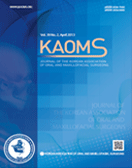Journal of the Korean Association of Oral and Maxillofacial Surgeons
- P-ISSN2234-7550
- E-ISSN2234-5930
- SCOPUS, KCI, ESCI
 ISSN : 2234-7550
ISSN : 2234-7550
Efficacy of botulinum toxin in the management of temporomandibular myofascial pain and sleep bruxism
Sezen Altindis (Kocaeli University)
Abstract
Objectives: This study sought to evaluate the efficacy of injecting botulinum toxin into the masseter and temporal muscles in patients with temporomandibular myofascial pain and sleep bruxism. Materials and Methods: The study was conducted based on a clinical record review of 44 patients (36 females and eight males; mean age, 35.70±12.66 years). Patients who underwent the injection of botulinum toxin into the masseter and temporal muscles for the management of temporomandibular myofascial pain and sleep bruxism were included in the study. Patients were diagnosed based on the Diagnostic Criteria for Temporomandibular Disorders. Sleep bruxism was diagnosed according to the criteria defined by the American Academy of Sleep Medicine. The values of the visual analogue scale (VAS) and range of jaw motion, including unassisted maximum mouth opening (MMO), protrusion, and right and left laterotrusion, were observed preoperatively and postoperatively at one-, three-, and six-month follow-up visits. Results: MMO, movements of the right and the left laterotrusion, and protrusion increased significantly (P<0.05), while VAS ratings decreased significantly at the three follow-up points relative to baseline values (P<0.05). Conclusion: Botulinum toxin is an effective treatment for patients with temporomandibular myofascial pain and sleep bruxism.
- keywords
- Temporomandibular joint disorders, Sleep bruxism, Botulinum toxin
- 다운로드 수
- 조회수
- 0KCI 피인용수
- 0WOS 피인용수